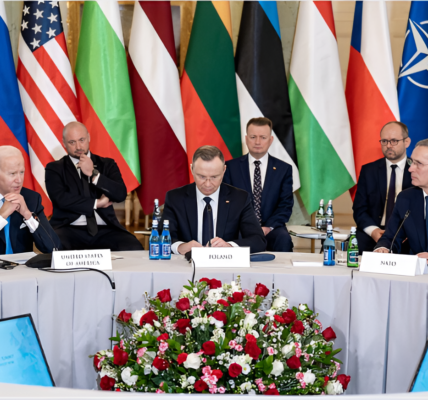
Turkey is using the ongoing Russian invasion of Ukraine as leverage to reshape NATO’s internal dynamics. In a surprising move, Ankara has thrown a wrench into Sweden and Finland’s expected swift accession to the alliance, shaking up the strategic calculus of the June 2022 Madrid summit. Turkey, a NATO member since 1952, is demanding significant concessions from these two Nordic countries, including stronger counter-terrorism measures, the extradition of Kurdish citizens, and the lifting of arms embargoes imposed after Turkey’s 2019 invasion of Syria.
This move highlights the disparity between Turkey’s narrow security concerns and NATO’s broader mission of deterring Russia. The issue has become a flashpoint in debates about Turkey’s role within the alliance, revealing sharp divisions in the West. Critics argue that Turkey’s close ties to Moscow, refusal to fully align with sanctions against Russia, and its contentious actions in Syria undermine NATO’s unity. Supporters, however, point to Turkey’s large military force, its strategic role in countering Russian expansionism, and its support for Ukraine as evidence that Turkey still plays a vital part in the alliance.
The debate often boils down to two opposing views. Turkey’s critics dismiss President Recep Tayyip Erdogan’s demands as populist ploys to consolidate power at home, while his supporters argue that his concerns are genuine and rooted in national security. Both perspectives miss a crucial point: Turkey’s security concerns are real, but they are framed and understood through an anti-Western lens that complicates NATO’s mission.
Turkey’s foreign policy under Erdogan is driven by a deep sense of grievance over past NATO actions. Ankara is using its influence within the alliance to force a rethinking of NATO’s security priorities, particularly in relation to counter-terrorism. While Turkey’s demands for extradition and the curtailing of free speech in Western democracies may be seen as unreasonable by many, they reflect a broader vision of security that is fundamentally at odds with the values of NATO.
The Roots of Turkey’s Discontent
Erdogan’s often blunt rhetoric about NATO and the United States is frequently dismissed as posturing aimed at appeasing domestic constituencies. However, to ignore the depth of Turkey’s grievances is a mistake. Turkey’s security concerns are rooted in its perception of threats from both within and outside its borders. One of the central issues is Turkey’s ongoing struggle with Kurdish separatists, particularly the Kurdistan Workers’ Party (PKK), which Ankara considers a terrorist group. This issue has become a touchstone in Turkey’s strained relations with Western allies, who have tended to support Kurdish forces in Syria and Iraq as allies in the fight against ISIS.
Turkey’s strained relations with NATO have also been exacerbated by the United States’ deepening ties with Greece, which Turkey views as an adversary. Ankara’s refusal to back down in the face of Western sanctions following its purchase of the Russian S-400 missile system is a reflection of its broader national security strategy. In particular, Turkey’s frustration with the U.S. exclusion from the F-35 fighter program and its inability to access critical military technology has deepened its distrust of Washington.
These issues are interconnected with Turkey’s broader view of NATO, in which the alliance is seen as selectively supportive. Turkey has long believed that NATO has failed to give it the same level of solidarity in its security concerns as it has afforded other member states, particularly Greece. This sense of being sidelined has driven Turkey to seek a more assertive role in shaping the alliance’s priorities, particularly with regard to counter-terrorism.
Turkey’s Strategic Push
Turkey’s opposition to Sweden and Finland’s NATO membership is not just a bargaining tactic—it is part of a broader effort to shift NATO’s focus to issues that Ankara deems critical to its security. Erdogan’s government is leveraging its veto power over NATO expansion to push for changes in the alliance’s approach to terrorism and defense policy. While some of Turkey’s demands—such as the extradition of Kurdish activists—may be seen as excessive by Western standards, they reflect a deeper anxiety about Turkey’s place in the world order.
The Turkish government’s insistence on these issues is not merely a matter of domestic politics; it is rooted in a strategic calculation about the country’s future security. The slow pace of NATO enlargement, the restrictions on arms sales to Turkey, and the Western alliances with Turkey’s regional rivals have all contributed to Ankara’s belief that it needs to force NATO to take its security concerns seriously. This includes demanding that Sweden and Finland crack down on Kurdish groups that Ankara considers terrorists, even if these demands conflict with the values of freedom of expression and political asylum that many NATO members hold dear.
A Divided NATO
The Turkish government’s strategic maneuvering has exposed deep divisions within NATO over its approach to Turkey. While many members view Turkey as a valuable ally in the fight against Russia and the broader struggle for influence in the Middle East, others are increasingly wary of Ankara’s authoritarian domestic policies and its growing relationship with Moscow. This division is especially apparent in the debates over NATO enlargement, where Turkey’s opposition to Sweden and Finland’s membership has complicated efforts to strengthen the alliance.
The challenge for NATO is to balance Turkey’s legitimate security concerns with its broader goals of unity and deterrence. While the alliance is united in its commitment to defending its members against external threats, the internal divisions over Turkey’s role are likely to persist. Ankara’s demands are not simply tactical ploys but a reflection of a broader worldview in which Turkey seeks to assert its own priorities within the NATO framework.
Looking Ahead: A Transactional Relationship
The future of Turkey’s relationship with NATO is likely to be characterized by a transactional approach. Given Turkey’s strategic importance and its position as a key player in the alliance, NATO will need to engage in constant diplomacy to manage its relationship with Ankara. The Turkish government will continue to use its veto power over NATO decisions to extract concessions from the alliance, especially on issues related to counter-terrorism and defense policy.
At the same time, NATO must acknowledge that Turkey’s worldview is shaped by its own national security concerns, which are often at odds with the alliance’s broader goals. The challenge for NATO will be to find ways to engage with Turkey that balance these competing interests while maintaining the unity and effectiveness of the alliance as a whole. This may require difficult compromises, but it is clear that Turkey will remain a central player in NATO’s future—whether as a partner or a challenger.




